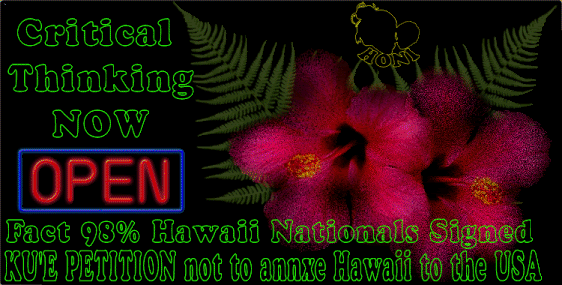All Posts (6434)
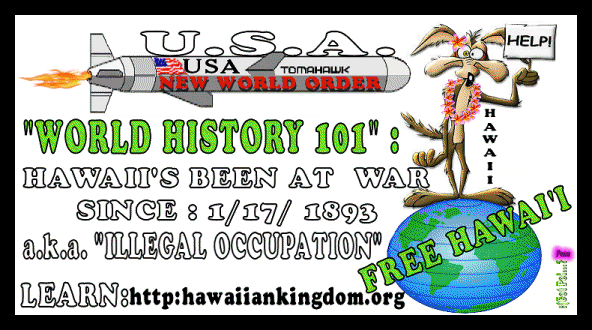 Aloha kakou,URGENT ACTION ALERT TO PROTECT MAKUA VALLEY: Army Threatens to Expand Live-Fire TrainingThe Army plans to expend over two million munitions annually - further destroying the beautiful and sacred Makua valley during their proposed 242/365 days of war games. These munitions include the most threatening illumination munitions, 120mm HE mortars, 155mm HE howitzers, inert TOW missiles and 2.75 caliber rockets, some of which will be launched from helicopters, and all of which the Army admits will increase chances of wildfire and "physical damage and loss of mana for the Native Hawaiian culture" (SEIS 4-199).• The devastating impacts of wildfire caused by Army war games are unacceptable.• Any further desecration of our sacred sites is unacceptable.• Limiting access to the valley is not acceptable.It is time to demand that the Army clean up Makua and return the valley to the people.DEMAND CLEAN UP, RESTORATION AND RETURN OF MAKUAFor three decades, the Hawaiian movement for aloha ‘āina has worked to protect Makua valley from the US military. We have been successful, and in the process, have won important religious and cultural access rights, and have temporarily stopped training in the valley. The military wants to reverse these advances, though, by returning the violence of live-fire training to Makua.We are asking for everyone who loves Makua, and who loves our home of Hawaii, to please come to these hearings. The legal process is flawed – yes. But showing opposition to the re-militarization of Makua is important!So please do come, and be bold and bright. If you need a ride, send an email to makua@dmzhawaii.com – we'll coordinate a carpool from Honolulu and the Koolau side.BackgroundMakua is a valley on the west side of O’ahu that is sacred to Kanaka Maoli (Native Hawaiians) and the location of extensive cultural sites and endangered native ecosystems. The U.S. military began using Makua for live fire training in the 1920s. In 1942, the Army seized the entire valley, evicted the residents and transformed the once fertile valley into a land of orphaned families, unexploded bombs, fires and toxic chemicals.In 1976, soon after the first boatload of Kanaka Maoli activists landed on Kaho’olawe to protest the Navy bombing of that sacred island, the demonstrations spread to Makua to demand an end to the bombing of Makua. The struggle to free Makua has continued ever since.In 1992, the Wai’anae community resisted and defeated an Army proposal to expand open pit disposal of old munitions in Makua. This was the birth of the group Malama Makua. In 1998 Malama Makua sued the Army for failing to conduct an Environmental Impact Statement (EIS) for all of its destructive activities in Makua. After resisting doing an EIS for years, the Army finally agreed in 2001 to conduct a full EIS. Because the Army failed to meet agreed upon deadlines for completing its EIS, live fire training in Makua has been suspended for more than three years.On September 19, 2008, the Army released a Draft Supplemental Environmental Impact Statement (DSEIS) for training in Makua valley. The 45 day public comment period for this DSEIS ends November 3, 2008. Four public meetings have been scheduled on O’ahu and Hawai’i Island. This SEIS is the Army’s last hurdle before it would be able to resume training.What the DSEIS says:The DSEIS in an enormous document, more than 900 pages. The size of the document reflects the many concerns raised by the community over the years. The DSEIS confirms what the community has been concerned about for years - that Army training in Makua has had and will continue to worsen serious and unmitigable environmental, cultural and social impacts. And yet the Army proposes to expand its training footprint and activities significantly.More than 300 fires over the last twelve years, the last catastrophic fire in 2003 destroyed more than 2000 acres and killed several populations of endangered plants. Yet the DSEIS admits that devastation from wildfires will be even more likely due to the Army's plan to increase training to 242 days of war games every year with munitions known to cause wildfires. The document even mentions that training will occur all year long, day and night, despite the fact that fires are more likely to have devastating results during the dry months.The Army is also considering moving training activities from Makua to Pohakuloa on Hawai’i Island. This is outrageous and unacceptable to shift the destruction, contamination and suffering to any other community.What’s at stake?Makua, the Parents: A site in one Hawaiian creation story where Papa (Earth Mother) and Wakea (Sky father) created life on Earth. Also in the Pele and Hi’iaka epic, Makua is the site where Hi’iaka miraculously resurrected a drowned girl and defeated an evil invading spirit that threatened the people of Makua.One of the richest concentrations of Kanaka Maoli cultural sites, with more than 70% of the valley covered with terraces, shrines and temples, dwellings, burials and other important features.More than 40 endangered species, some of them found only in Makua.Makua is one of the last intact ahupua’a (land division from the mountain to the sea) on O’ahu, where Kanaka Maoli could learn and practice traditional land management methods and systems.Makua is a victim and an unwilling accessory of the illegal and immoral US wars in Iraq and Afghanistan. Makua is the manifestation of American empire in Hawai’i and the Pacific.What the People Want:We demand that the Army select the community’s preferred alternative, which was not even included in the list of alternatives considered: an end to Army training in Makua, a complete clean up and restoration of the environmental and cultural resources of the valley, and a return of the land to the community in consultation with the Kanaka Maoli people to be managed for sustainable and culturally appropriate uses. We refuse to let our lands be used to prepare for wars, invasions and occupations of other peoples’ lands that deprive other peoples of their lives, freedom and livelihoods.A Call to Action:This is an urgent call for all practitioners of aloha ‘aina, to all who love Hawai‘i nei to rally to protect Makua. It is important to have a strong turn out at the first hearing on October 6, 2008 to demonstrate the community’s unwavering opposition to any further military training in Makua.If you have any questions about the action or how you can kokua, please leave a message at DMZ and someone will contact you.DMZ Hawaii/Aloha Aina808-988-6266Information about the Makua DSEIS, including the actual document, may be downloaded from the Army website:http://www.garrison.hawaii.army.mil/makuaeis/default.htmPublic meetings will be held at the locations listed below. Each meeting will consist of an open house from 5:30 p.m. – 6:45 p.m., where information will be provided on the SDEIS, followed by a public comment session from 7 p.m. – 9:30 p.m.* October 6, 2008Nanakuli High School Cafeteria89-980 Nanakuli AvenueWaianae, HI 96792* October 7, 2008Wahiawa District Park Recreation Center1129 Kilani AveWahiawa, HI 96786* October 8, 2008Aunty Sally Kaleohano's Luau Hale799 Piilani StreetHilo, HI 96720* October 9, 2008Waimea Community Center65-1260 Kawaihae Road
Aloha kakou,URGENT ACTION ALERT TO PROTECT MAKUA VALLEY: Army Threatens to Expand Live-Fire TrainingThe Army plans to expend over two million munitions annually - further destroying the beautiful and sacred Makua valley during their proposed 242/365 days of war games. These munitions include the most threatening illumination munitions, 120mm HE mortars, 155mm HE howitzers, inert TOW missiles and 2.75 caliber rockets, some of which will be launched from helicopters, and all of which the Army admits will increase chances of wildfire and "physical damage and loss of mana for the Native Hawaiian culture" (SEIS 4-199).• The devastating impacts of wildfire caused by Army war games are unacceptable.• Any further desecration of our sacred sites is unacceptable.• Limiting access to the valley is not acceptable.It is time to demand that the Army clean up Makua and return the valley to the people.DEMAND CLEAN UP, RESTORATION AND RETURN OF MAKUAFor three decades, the Hawaiian movement for aloha ‘āina has worked to protect Makua valley from the US military. We have been successful, and in the process, have won important religious and cultural access rights, and have temporarily stopped training in the valley. The military wants to reverse these advances, though, by returning the violence of live-fire training to Makua.We are asking for everyone who loves Makua, and who loves our home of Hawaii, to please come to these hearings. The legal process is flawed – yes. But showing opposition to the re-militarization of Makua is important!So please do come, and be bold and bright. If you need a ride, send an email to makua@dmzhawaii.com – we'll coordinate a carpool from Honolulu and the Koolau side.BackgroundMakua is a valley on the west side of O’ahu that is sacred to Kanaka Maoli (Native Hawaiians) and the location of extensive cultural sites and endangered native ecosystems. The U.S. military began using Makua for live fire training in the 1920s. In 1942, the Army seized the entire valley, evicted the residents and transformed the once fertile valley into a land of orphaned families, unexploded bombs, fires and toxic chemicals.In 1976, soon after the first boatload of Kanaka Maoli activists landed on Kaho’olawe to protest the Navy bombing of that sacred island, the demonstrations spread to Makua to demand an end to the bombing of Makua. The struggle to free Makua has continued ever since.In 1992, the Wai’anae community resisted and defeated an Army proposal to expand open pit disposal of old munitions in Makua. This was the birth of the group Malama Makua. In 1998 Malama Makua sued the Army for failing to conduct an Environmental Impact Statement (EIS) for all of its destructive activities in Makua. After resisting doing an EIS for years, the Army finally agreed in 2001 to conduct a full EIS. Because the Army failed to meet agreed upon deadlines for completing its EIS, live fire training in Makua has been suspended for more than three years.On September 19, 2008, the Army released a Draft Supplemental Environmental Impact Statement (DSEIS) for training in Makua valley. The 45 day public comment period for this DSEIS ends November 3, 2008. Four public meetings have been scheduled on O’ahu and Hawai’i Island. This SEIS is the Army’s last hurdle before it would be able to resume training.What the DSEIS says:The DSEIS in an enormous document, more than 900 pages. The size of the document reflects the many concerns raised by the community over the years. The DSEIS confirms what the community has been concerned about for years - that Army training in Makua has had and will continue to worsen serious and unmitigable environmental, cultural and social impacts. And yet the Army proposes to expand its training footprint and activities significantly.More than 300 fires over the last twelve years, the last catastrophic fire in 2003 destroyed more than 2000 acres and killed several populations of endangered plants. Yet the DSEIS admits that devastation from wildfires will be even more likely due to the Army's plan to increase training to 242 days of war games every year with munitions known to cause wildfires. The document even mentions that training will occur all year long, day and night, despite the fact that fires are more likely to have devastating results during the dry months.The Army is also considering moving training activities from Makua to Pohakuloa on Hawai’i Island. This is outrageous and unacceptable to shift the destruction, contamination and suffering to any other community.What’s at stake?Makua, the Parents: A site in one Hawaiian creation story where Papa (Earth Mother) and Wakea (Sky father) created life on Earth. Also in the Pele and Hi’iaka epic, Makua is the site where Hi’iaka miraculously resurrected a drowned girl and defeated an evil invading spirit that threatened the people of Makua.One of the richest concentrations of Kanaka Maoli cultural sites, with more than 70% of the valley covered with terraces, shrines and temples, dwellings, burials and other important features.More than 40 endangered species, some of them found only in Makua.Makua is one of the last intact ahupua’a (land division from the mountain to the sea) on O’ahu, where Kanaka Maoli could learn and practice traditional land management methods and systems.Makua is a victim and an unwilling accessory of the illegal and immoral US wars in Iraq and Afghanistan. Makua is the manifestation of American empire in Hawai’i and the Pacific.What the People Want:We demand that the Army select the community’s preferred alternative, which was not even included in the list of alternatives considered: an end to Army training in Makua, a complete clean up and restoration of the environmental and cultural resources of the valley, and a return of the land to the community in consultation with the Kanaka Maoli people to be managed for sustainable and culturally appropriate uses. We refuse to let our lands be used to prepare for wars, invasions and occupations of other peoples’ lands that deprive other peoples of their lives, freedom and livelihoods.A Call to Action:This is an urgent call for all practitioners of aloha ‘aina, to all who love Hawai‘i nei to rally to protect Makua. It is important to have a strong turn out at the first hearing on October 6, 2008 to demonstrate the community’s unwavering opposition to any further military training in Makua.If you have any questions about the action or how you can kokua, please leave a message at DMZ and someone will contact you.DMZ Hawaii/Aloha Aina808-988-6266Information about the Makua DSEIS, including the actual document, may be downloaded from the Army website:http://www.garrison.hawaii.army.mil/makuaeis/default.htmPublic meetings will be held at the locations listed below. Each meeting will consist of an open house from 5:30 p.m. – 6:45 p.m., where information will be provided on the SDEIS, followed by a public comment session from 7 p.m. – 9:30 p.m.* October 6, 2008Nanakuli High School Cafeteria89-980 Nanakuli AvenueWaianae, HI 96792* October 7, 2008Wahiawa District Park Recreation Center1129 Kilani AveWahiawa, HI 96786* October 8, 2008Aunty Sally Kaleohano's Luau Hale799 Piilani StreetHilo, HI 96720* October 9, 2008Waimea Community Center65-1260 Kawaihae Road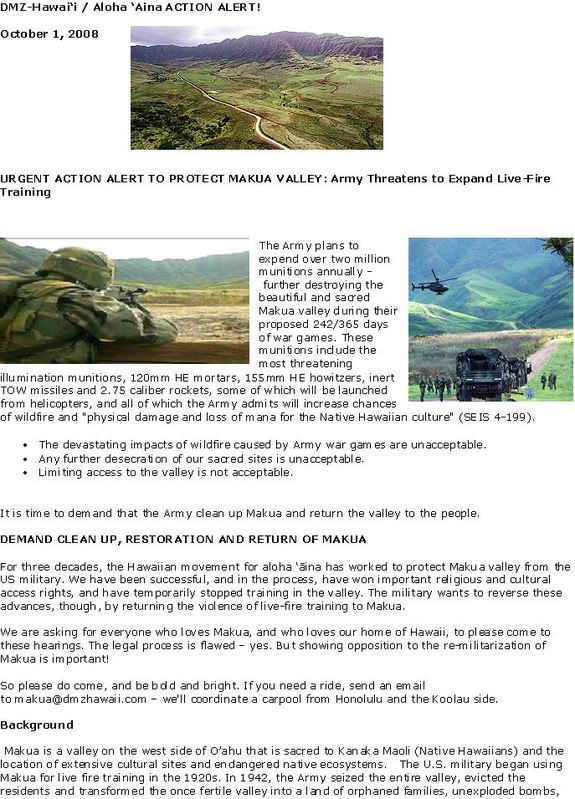
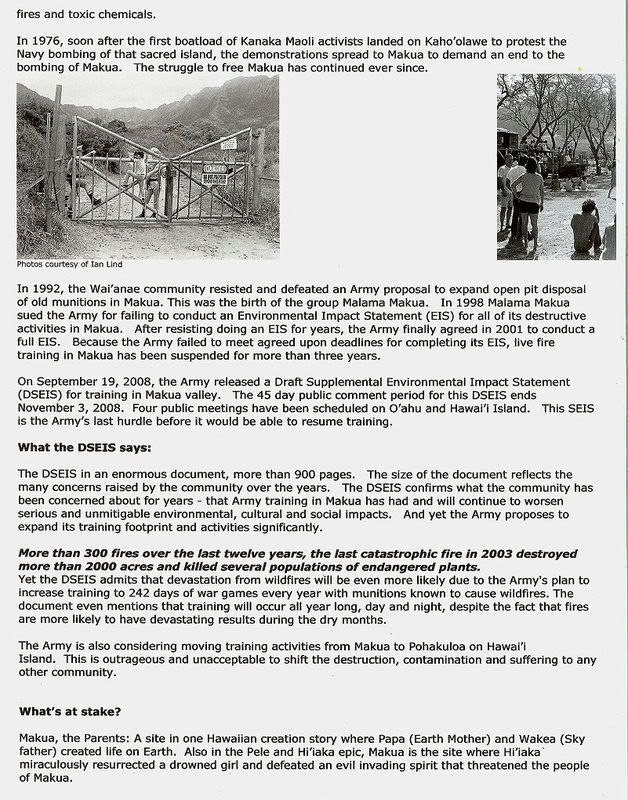
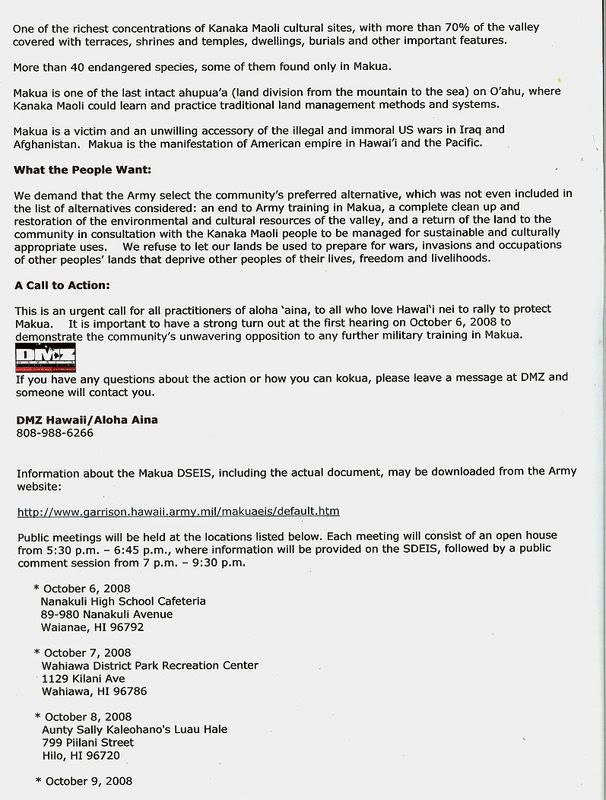


 COLONIALISM CONTINUES TODAY BY USA !"USA" ,A STOLEN NATION BUILT ON RACISM,SLAVERY and GENOCIDE..NOW in 1993 Hawai'i " WHICH IS ILLEGALLY OCCUPIED GETS THIS SO CALLED "APOLOGY BILL" STATING YES, "USA" WAS RESPONSIBLE FOR THE ILLEGAL OVERTHROW OF OUR KINGDOM AND IMPRISONMENT OF OUR QUEEN " LILI'UOKALANI..ANNEXATION and STATEHOOD ARE BOTH A FRAUD and FARCE CARRIED OUT BY COLONIAL ELITEST CONTROLING THE USA.NOW THE SAME PERVERED , SICK ,RACIST PROGRAM "USA'S" WANTS TO FINISH IT'S CORRUPT ILLEGAL THEFT OF OUR SOVEREIGN " NEUTRAL" NATION AND ITS LANDS !!!LEARN : http://www.hawaiiankingdom.org/us-occupation.shtmlU.S. high court will hear isle land caseState ceded lands transfer gets test before high courthttp://www.starbulletin.com/news/hawaiinews/20081002_US_high_court_will_hear_isle_land_case.html?page=all&c=yBy Ken KobayashiPOSTED: 01:30 a.m. HST, Oct 02, 2008The U.S. Supreme Court will likely rule next year on whether the state can transfer or sell lands that once belonged to the Hawaiian monarchy.What is at stake in ceded-lands caseThe U.S. Supreme Court will rule on whether the state can sell or transfer ceded lands that once belonged to the Hawaiian monarchy. ISSUE: Was the Hawaii Supreme Court correct when it ruled on Jan. 31 that the state cannot sell or transfer any of the 1.2 million acres of ceded lands until pending claims by native Hawaiians to the lands are settled and resolved?STATE: The Hawaii court is wrong in interpreting Congress' 1993 Apology Resolution as prohibiting the transfer or sales until a settlement. Even if that is what Congress intended, the ruling infringes on the state's sovereign rights involving its lands.OHA: The Office of Hawaiian Affairs believes the ceded lands are irreplaceable and hugely important to native Hawaiians. The Hawaii Supreme Court's Jan. 31 decision was a landmark ruling that correctly interpreted the Apology Resolution. OHA had urged the U.S. Supreme Court to reject the state's appeal.At least four of the nine high-court justices granted the state's request yesterday to hear an appeal of a Hawaii Supreme Court ruling that blocked the transfer of what are known as crown or ceded lands for a housing development on Maui.The state high court ruled that the lands should not be transferred or sold until a settlement is reached of native Hawaiian claims to the ceded property.The ruling by the U.S. Supreme Court, which is expected before the end of its term in June, will be considered significant. Ceded lands make up 1.2 million acres throughout Hawaii, or about 29 percent of the total land in the state.The state maintains that states have a sovereign right to sell or transfer lands without interference by the federal government. Twenty-nine states joined the state attorney general's office in urging the high-court justices to take the case."We believe that prudent management of those lands for the benefit of all of Hawaii's citizens must include, on occasion, the right to sell or exchange land," Attorney General Mark Bennett said.But the Office of Hawaiian Affairs, which filed a lawsuit seeking to block the transfer, believes the preservation of the land is critically important to native Hawaiians."Each piece of land is unique and irreplaceable," said Office of Hawaiian Affairs lawyer Sherry Broder.OHA officials say they believe the U.S. Supreme Court will uphold the state court's ruling."We firmly stand behind the state Supreme Court's opinion, which says the state should keep the ceded land trust intact until native Hawaiian claims to these lands are settled," said OHA board Chairwoman Haunani Apoliona.The case involves the state's attempt to transfer ceded lands for low-cost housing on Maui.The ceded lands were transferred to the federal government following the overthrow of the Hawaiian monarchy in 1893 and later given to Hawaii upon statehood in the 1959 Admission Act.The state holds the land in trust for public purposes and the betterment of native Hawaiians.In 1992 the state transferred 500 acres to the predecessor of the state Housing and Community Development Corp. for the low-cost housing development at Leialii on Maui.The corporation tried to give OHA a check for $5.6 million, 20 percent of the land's worth, but OHA refused to accept the money because it did not want to give up any claims to the property.OHA later filed a lawsuit to block the transfer.On Jan. 31 the Hawaii Supreme Court agreed with OHA in a 93-page unanimous decision. The state court interpreted Congress' 1993 apology resolution as preventing the transfer or sale of ceded lands until native Hawaiian claims to those lands are resolved.The U.S. Supreme Court grants only an estimated 1 percent of all requests to review cases, and agreed yesterday, without comment, to review the Hawaii Supreme Court decision.Bennett said he was pleased."We believe that the Hawaii Supreme Court was incorrect in its holding that the Congress, in the Apology Resolution, barred the state of Hawaii from selling or transferring ceded lands," he said.He said Congress gave the state that right by the Admission Act.Apoliona noted that the Hawaii Supreme Court cited the Apology Resolution, which said the overthrow of the Hawaii monarchy was "illegal" and apologized to native Hawaiians for the U.S. military's participation.In the state high court's decision, Chief Justice Ronald Moon wrote that the state justices believe the Apology Resolution mandated that the state has a duty to preserve the ceded lands "until such time as the unrelinquished claims of the native Hawaiians have been resolved."Bennett said he believes he has a "strong case" and hopes the other states will also file briefs with the high court urging it to overturn the Hawaii Supreme Court decision.Broder also said they have "strong arguments" in upholding the state high court's ruling.There are no other pending attempts to sell or transfer ceded lands because the administrations of former Gov. Ben Cayetano and Gov. Linda Lingle refrained from any such moves until the issue involving the Maui land transfer is resolved, according to Bennett.Broder said it shows the sale of ceded lands is not that critical to the state because it has been "able to continue doing its business without selling any ceded lands."The U.S. Supreme Court will likely rule next year on whether the state can transfer or sell lands that once belonged to the Hawaiian monarchy.What is at stake in ceded-lands caseThe U.S. Supreme Court will rule on whether the state can sell or transfer ceded lands that once belonged to the Hawaiian monarchy.ISSUE: Was the Hawaii Supreme Court correct when it ruled on Jan. 31 that the state cannot sell or transfer any of the 1.2 million acres of ceded lands until pending claims by native Hawaiians to the lands are settled and resolved?STATE: The Hawaii court is wrong in interpreting Congress' 1993 Apology Resolution as prohibiting the transfer or sales until a settlement. Even if that is what Congress intended, the ruling infringes on the state's sovereign rights involving its lands.OHA: The Office of Hawaiian Affairs believes the ceded lands are irreplaceable and hugely important to native Hawaiians. The Hawaii Supreme Court's Jan. 31 decision was a landmark ruling that correctly interpreted the Apology Resolution. OHA had urged the U.S. Supreme Court to reject the state's appeal.At least four of the nine high-court justices granted the state's request yesterday to hear an appeal of a Hawaii Supreme Court ruling that blocked the transfer of what are known as crown or ceded lands for a housing development on Maui.The state high court ruled that the lands should not be transferred or sold until a settlement is reached of native Hawaiian claims to the ceded property.The ruling by the U.S. Supreme Court, which is expected before the end of its term in June, will be considered significant. Ceded lands make up 1.2 million acres throughout Hawaii, or about 29 percent of the total land in the state.The state maintains that states have a sovereign right to sell or transfer lands without interference by the federal government. Twenty-nine states joined the state attorney general's office in urging the high-court justices to take the case."We believe that prudent management of those lands for the benefit of all of Hawaii's citizens must include, on occasion, the right to sell or exchange land," Attorney General Mark Bennett said.But the Office of Hawaiian Affairs, which filed a lawsuit seeking to block the transfer, believes the preservation of the land is critically important to native Hawaiians."Each piece of land is unique and irreplaceable," said Office of Hawaiian Affairs lawyer Sherry Broder.OHA officials say they believe the U.S. Supreme Court will uphold the state court's ruling."We firmly stand behind the state Supreme Court's opinion, which says the state should keep the ceded land trust intact until native Hawaiian claims to these lands are settled," said OHA board Chairwoman Haunani Apoliona.The case involves the state's attempt to transfer ceded lands for low-cost housing on Maui.The ceded lands were transferred to the federal government following the overthrow of the Hawaiian monarchy in 1893 and later given to Hawaii upon statehood in the 1959 Admission Act.The state holds the land in trust for public purposes and the betterment of native Hawaiians.In 1992 the state transferred 500 acres to the predecessor of the state Housing and Community Development Corp. for the low-cost housing development at Leialii on Maui.The corporation tried to give OHA a check for $5.6 million, 20 percent of the land's worth, but OHA refused to accept the money because it did not want to give up any claims to the property.OHA later filed a lawsuit to block the transfer.On Jan. 31 the Hawaii Supreme Court agreed with OHA in a 93-page unanimous decision. The state court interpreted Congress' 1993 apology resolution as preventing the transfer or sale of ceded lands until native Hawaiian claims to those lands are resolved.The U.S. Supreme Court grants only an estimated 1 percent of all requests to review cases, and agreed yesterday, without comment, to review the Hawaii Supreme Court decision.Bennett said he was pleased."We believe that the Hawaii Supreme Court was incorrect in its holding that the Congress, in the Apology Resolution, barred the state of Hawaii from selling or transferring ceded lands," he said.He said Congress gave the state that right by the Admission Act.Apoliona noted that the Hawaii Supreme Court cited the Apology Resolution, which said the overthrow of the Hawaii monarchy was "illegal" and apologized to native Hawaiians for the U.S. military's participation.In the state high court's decision, Chief Justice Ronald Moon wrote that the state justices believe the Apology Resolution mandated that the state has a duty to preserve the ceded lands "until such time as the unrelinquished claims of the native Hawaiians have been resolved."Bennett said he believes he has a "strong case" and hopes the other states will also file briefs with the high court urging it to overturn the Hawaii Supreme Court decision.Broder also said they have "strong arguments" in upholding the state high court's ruling.There are no other pending attempts to sell or transfer ceded lands because the administrations of former Gov. Ben Cayetano and Gov. Linda Lingle refrained from any such moves until the issue involving the Maui land transfer is resolved, according to Bennett.Broder said it shows the sale of ceded lands is not that critical to the state because it has been "able to continue doing its business without selling any ceded lands."
COLONIALISM CONTINUES TODAY BY USA !"USA" ,A STOLEN NATION BUILT ON RACISM,SLAVERY and GENOCIDE..NOW in 1993 Hawai'i " WHICH IS ILLEGALLY OCCUPIED GETS THIS SO CALLED "APOLOGY BILL" STATING YES, "USA" WAS RESPONSIBLE FOR THE ILLEGAL OVERTHROW OF OUR KINGDOM AND IMPRISONMENT OF OUR QUEEN " LILI'UOKALANI..ANNEXATION and STATEHOOD ARE BOTH A FRAUD and FARCE CARRIED OUT BY COLONIAL ELITEST CONTROLING THE USA.NOW THE SAME PERVERED , SICK ,RACIST PROGRAM "USA'S" WANTS TO FINISH IT'S CORRUPT ILLEGAL THEFT OF OUR SOVEREIGN " NEUTRAL" NATION AND ITS LANDS !!!LEARN : http://www.hawaiiankingdom.org/us-occupation.shtmlU.S. high court will hear isle land caseState ceded lands transfer gets test before high courthttp://www.starbulletin.com/news/hawaiinews/20081002_US_high_court_will_hear_isle_land_case.html?page=all&c=yBy Ken KobayashiPOSTED: 01:30 a.m. HST, Oct 02, 2008The U.S. Supreme Court will likely rule next year on whether the state can transfer or sell lands that once belonged to the Hawaiian monarchy.What is at stake in ceded-lands caseThe U.S. Supreme Court will rule on whether the state can sell or transfer ceded lands that once belonged to the Hawaiian monarchy. ISSUE: Was the Hawaii Supreme Court correct when it ruled on Jan. 31 that the state cannot sell or transfer any of the 1.2 million acres of ceded lands until pending claims by native Hawaiians to the lands are settled and resolved?STATE: The Hawaii court is wrong in interpreting Congress' 1993 Apology Resolution as prohibiting the transfer or sales until a settlement. Even if that is what Congress intended, the ruling infringes on the state's sovereign rights involving its lands.OHA: The Office of Hawaiian Affairs believes the ceded lands are irreplaceable and hugely important to native Hawaiians. The Hawaii Supreme Court's Jan. 31 decision was a landmark ruling that correctly interpreted the Apology Resolution. OHA had urged the U.S. Supreme Court to reject the state's appeal.At least four of the nine high-court justices granted the state's request yesterday to hear an appeal of a Hawaii Supreme Court ruling that blocked the transfer of what are known as crown or ceded lands for a housing development on Maui.The state high court ruled that the lands should not be transferred or sold until a settlement is reached of native Hawaiian claims to the ceded property.The ruling by the U.S. Supreme Court, which is expected before the end of its term in June, will be considered significant. Ceded lands make up 1.2 million acres throughout Hawaii, or about 29 percent of the total land in the state.The state maintains that states have a sovereign right to sell or transfer lands without interference by the federal government. Twenty-nine states joined the state attorney general's office in urging the high-court justices to take the case."We believe that prudent management of those lands for the benefit of all of Hawaii's citizens must include, on occasion, the right to sell or exchange land," Attorney General Mark Bennett said.But the Office of Hawaiian Affairs, which filed a lawsuit seeking to block the transfer, believes the preservation of the land is critically important to native Hawaiians."Each piece of land is unique and irreplaceable," said Office of Hawaiian Affairs lawyer Sherry Broder.OHA officials say they believe the U.S. Supreme Court will uphold the state court's ruling."We firmly stand behind the state Supreme Court's opinion, which says the state should keep the ceded land trust intact until native Hawaiian claims to these lands are settled," said OHA board Chairwoman Haunani Apoliona.The case involves the state's attempt to transfer ceded lands for low-cost housing on Maui.The ceded lands were transferred to the federal government following the overthrow of the Hawaiian monarchy in 1893 and later given to Hawaii upon statehood in the 1959 Admission Act.The state holds the land in trust for public purposes and the betterment of native Hawaiians.In 1992 the state transferred 500 acres to the predecessor of the state Housing and Community Development Corp. for the low-cost housing development at Leialii on Maui.The corporation tried to give OHA a check for $5.6 million, 20 percent of the land's worth, but OHA refused to accept the money because it did not want to give up any claims to the property.OHA later filed a lawsuit to block the transfer.On Jan. 31 the Hawaii Supreme Court agreed with OHA in a 93-page unanimous decision. The state court interpreted Congress' 1993 apology resolution as preventing the transfer or sale of ceded lands until native Hawaiian claims to those lands are resolved.The U.S. Supreme Court grants only an estimated 1 percent of all requests to review cases, and agreed yesterday, without comment, to review the Hawaii Supreme Court decision.Bennett said he was pleased."We believe that the Hawaii Supreme Court was incorrect in its holding that the Congress, in the Apology Resolution, barred the state of Hawaii from selling or transferring ceded lands," he said.He said Congress gave the state that right by the Admission Act.Apoliona noted that the Hawaii Supreme Court cited the Apology Resolution, which said the overthrow of the Hawaii monarchy was "illegal" and apologized to native Hawaiians for the U.S. military's participation.In the state high court's decision, Chief Justice Ronald Moon wrote that the state justices believe the Apology Resolution mandated that the state has a duty to preserve the ceded lands "until such time as the unrelinquished claims of the native Hawaiians have been resolved."Bennett said he believes he has a "strong case" and hopes the other states will also file briefs with the high court urging it to overturn the Hawaii Supreme Court decision.Broder also said they have "strong arguments" in upholding the state high court's ruling.There are no other pending attempts to sell or transfer ceded lands because the administrations of former Gov. Ben Cayetano and Gov. Linda Lingle refrained from any such moves until the issue involving the Maui land transfer is resolved, according to Bennett.Broder said it shows the sale of ceded lands is not that critical to the state because it has been "able to continue doing its business without selling any ceded lands."The U.S. Supreme Court will likely rule next year on whether the state can transfer or sell lands that once belonged to the Hawaiian monarchy.What is at stake in ceded-lands caseThe U.S. Supreme Court will rule on whether the state can sell or transfer ceded lands that once belonged to the Hawaiian monarchy.ISSUE: Was the Hawaii Supreme Court correct when it ruled on Jan. 31 that the state cannot sell or transfer any of the 1.2 million acres of ceded lands until pending claims by native Hawaiians to the lands are settled and resolved?STATE: The Hawaii court is wrong in interpreting Congress' 1993 Apology Resolution as prohibiting the transfer or sales until a settlement. Even if that is what Congress intended, the ruling infringes on the state's sovereign rights involving its lands.OHA: The Office of Hawaiian Affairs believes the ceded lands are irreplaceable and hugely important to native Hawaiians. The Hawaii Supreme Court's Jan. 31 decision was a landmark ruling that correctly interpreted the Apology Resolution. OHA had urged the U.S. Supreme Court to reject the state's appeal.At least four of the nine high-court justices granted the state's request yesterday to hear an appeal of a Hawaii Supreme Court ruling that blocked the transfer of what are known as crown or ceded lands for a housing development on Maui.The state high court ruled that the lands should not be transferred or sold until a settlement is reached of native Hawaiian claims to the ceded property.The ruling by the U.S. Supreme Court, which is expected before the end of its term in June, will be considered significant. Ceded lands make up 1.2 million acres throughout Hawaii, or about 29 percent of the total land in the state.The state maintains that states have a sovereign right to sell or transfer lands without interference by the federal government. Twenty-nine states joined the state attorney general's office in urging the high-court justices to take the case."We believe that prudent management of those lands for the benefit of all of Hawaii's citizens must include, on occasion, the right to sell or exchange land," Attorney General Mark Bennett said.But the Office of Hawaiian Affairs, which filed a lawsuit seeking to block the transfer, believes the preservation of the land is critically important to native Hawaiians."Each piece of land is unique and irreplaceable," said Office of Hawaiian Affairs lawyer Sherry Broder.OHA officials say they believe the U.S. Supreme Court will uphold the state court's ruling."We firmly stand behind the state Supreme Court's opinion, which says the state should keep the ceded land trust intact until native Hawaiian claims to these lands are settled," said OHA board Chairwoman Haunani Apoliona.The case involves the state's attempt to transfer ceded lands for low-cost housing on Maui.The ceded lands were transferred to the federal government following the overthrow of the Hawaiian monarchy in 1893 and later given to Hawaii upon statehood in the 1959 Admission Act.The state holds the land in trust for public purposes and the betterment of native Hawaiians.In 1992 the state transferred 500 acres to the predecessor of the state Housing and Community Development Corp. for the low-cost housing development at Leialii on Maui.The corporation tried to give OHA a check for $5.6 million, 20 percent of the land's worth, but OHA refused to accept the money because it did not want to give up any claims to the property.OHA later filed a lawsuit to block the transfer.On Jan. 31 the Hawaii Supreme Court agreed with OHA in a 93-page unanimous decision. The state court interpreted Congress' 1993 apology resolution as preventing the transfer or sale of ceded lands until native Hawaiian claims to those lands are resolved.The U.S. Supreme Court grants only an estimated 1 percent of all requests to review cases, and agreed yesterday, without comment, to review the Hawaii Supreme Court decision.Bennett said he was pleased."We believe that the Hawaii Supreme Court was incorrect in its holding that the Congress, in the Apology Resolution, barred the state of Hawaii from selling or transferring ceded lands," he said.He said Congress gave the state that right by the Admission Act.Apoliona noted that the Hawaii Supreme Court cited the Apology Resolution, which said the overthrow of the Hawaii monarchy was "illegal" and apologized to native Hawaiians for the U.S. military's participation.In the state high court's decision, Chief Justice Ronald Moon wrote that the state justices believe the Apology Resolution mandated that the state has a duty to preserve the ceded lands "until such time as the unrelinquished claims of the native Hawaiians have been resolved."Bennett said he believes he has a "strong case" and hopes the other states will also file briefs with the high court urging it to overturn the Hawaii Supreme Court decision.Broder also said they have "strong arguments" in upholding the state high court's ruling.There are no other pending attempts to sell or transfer ceded lands because the administrations of former Gov. Ben Cayetano and Gov. Linda Lingle refrained from any such moves until the issue involving the Maui land transfer is resolved, according to Bennett.Broder said it shows the sale of ceded lands is not that critical to the state because it has been "able to continue doing its business without selling any ceded lands."

It's Time!
Love local Hawaiian food & agriculture? Here's your opportunity to voice your support for a historic, groundbreaking new law that would ban GMO (genetically modified) Taro and Coffee on Hawai'i Island!
Click Here, it's easy to submit testimony of support, no matter where you live!
MUST Submit Testimony by TUESDAY October 7th
This Oct. 8th will be the final Hawai'i County Council vote on Bill 361
Public hearing in HILO- Ben Franklin Building, 2nd Floor. County Council Office
So Much Support So Far!
- Introduced by Council Member Angel Pilago, Bill 361 would ban the growing of genetically modified Taro and Coffee on the Big Island.
- This bill has received overwhelming public & political support, and has already successfully passed through two Council votes to make it to this FINAL VOTE.
- If the bill passes this last vote it will go on for final approval by Mayor Harry Kim of Hawaii County.
- At this critical moment this effort needs massive support more than ever- the local farmers and consumers need help standing up against the strong-arming by huge multinational corporations.

Art kindly donated by Solomon Enos, Hawaiian Artist/Farmer.
Support Native Art- www.HawaiianArtPlaza.com!
Kalo & Kona Coffee are perfect as they are!
If allowed, GMO taro could threaten taro's important status as the world's only hypoallergenic carbohydrate source!
Taro farming in Hawaii is an unique local tradition. There are now innovative and successful agricultural efforts underway to improve the local taro industry and perpetuate valuable Hawaiian taro varieties.
Long-term experiments have proven that the best way to comprehensively protect taro from disease blights is to grow many different varieties, improve soil quality and provide adequate water. There is no need or demand for GMO interference and industry control of local taro farming.
Genetic modification of this indigenous plant is also extremely disrespectful to the sacred genealogy of taro to Hawaiians, who view taro as an ancestral family member, Haloa.
If allowed, GMO coffee would erode the demand, drop prices, and destroy the local economy for pure Kona coffee. It would also make organic coffee growing virtually impossible.
Lessons learned: The local papaya industry was economically devastated by the introduction of GMO-papaya. Rejection of Hawaiian grown GMO-papaya by Japan dropped the value of the local papaya industry by over 50%. Sadly, about 40% of papaya farmers were forced out of business. Meanwhile, the value of the organic & conventional (non-GMO) papaya industry has increased.
What is a GMO?
GMOs (Genetically Modified Organisms) are plant mutants created by inserting genes from one species into another unrelated species, using virus & bacteria to transfer the genes. For example, forcing wheat genes into taro, or bacteria genes into corn. These man-made organisms can be patented and owned. Organic food growers have rejected GMO, and GMO food cannot be certified organic. This experimental technique is crude and imprecise, unsafe, unnatural and rejected by the governments of most nations and the majority of the world's population.
Click here to find out more about the GMO problems, read the Bill 361, and easily submit testimony.
If you are on the Big Island, please read:
Please attend this crucial hearing. While multi-national corporations seeking GMO patents and profits have deep pockets and resources, local communities depend on committed citizens to defend our rights to a clean environment and safe food. It is the dedication of those who care deeply about the future of food, culture and agriculture in Hawaii that makes the difference!
Let us learn from the economic & environmental destruction already caused by the GMO industry in the Philippines, Mexico, India, South America and farming communities all across America! Let's make sure it doesn't happen in Hawaii! We can and must show that Hawaii Island wants sustainable, pono, non-GMO agricultural job opportunities and will stand-up to protect our local agricultural economy & environment!
Wednesday October 8th
HILO- Ben Franklin Building, 2nd Floor. County Council Office.
We Know Better, So Let's Tell 'Em!
Bill 361 is a very important step to maintaining local control over our island food resources, consumer safety, environmental protections and economic opportunity. We have a real chance to create meaningful reform, to protect taro, and our heritage coffee for all future generations that are to come. Pests and disease in agriculture can be solved by ecological and sustainable means; we need to move in that direction. It is time for everyone to speak for community food self-reliance, and GMO coffee and taro does not move us in that direction. We need the Council to send a strong and unanimous message on this bill to the Mayor: Hawai'i Island wants protection and preservation for our unique heritage crops, that sustain our life, our families, and our communities.
Mahalo nui for your support at this unique time in history.
Please send this message on to all in your ohana and communities, that would want to know of this unique and powerful opportunity.
Malama Haloa!
Us Guys at KAHEA
The Hawaiian-Environmental Alliance
www.kahea.org
blog.kahea.org
toll free phone/fax 1-888-528-6288
 MAHALO! YOUR testimony helped restore water to East Maui
MAHALO! YOUR testimony helped restore water to East MauiMahalo piha Pono,
The East Maui taro farmers have expressed their deep gratitude to you folks, for caring enough to speak up in support of water rights for the farmers and native stream ecosystems. Read on to find out what happened...

Art kindly donated by Solomon Enos, Hawaiian artist/farmer.
Support Native Art- www.HawaiianArtPlaza.com!
Your voice helped make a historic decision last week. By taking the time to submit testimony to the Water Commission, you helped East Maui taro farmers, and taro farmers across the Hawaiian Islands, take a major step towards restoring desperately needed water to their streams.
- Partial stream flow was restored to 8 of the streams in East Maui. While not yet a comprehensive solution, it is an important beginning.
-This water will begin to help rehabilitate unique and endangered Hawaiian ecosystems and watershed resources that can benefit the entire community, not just one corporation.
Over 400 people submitted written testimony to the Water Commission and several hundred showed up to testify. Together, you successfully pushed the Water Commission to begin to uphold the water protections outlined in the Hawaii State Constitution and Water Code. Finally!
For over five years, the Water Commission (CWRM) and the Department of Land and Natural Resources (DLNR) have delayed enforcing the water rights of taro farmers and protecting the natural ecosystem & watershed, despite court rulings upholding those protections against corporate water diverters like East Maui Irrigation Company (EMI). EMI and its parent company, Alexander & Baldwin, have dominated politics and profitted from selling stolen public water since the days of big sugar plantations. You have helped to finally tip the balance in favor of the public, the environment, and the rule of law by demonstrating the overwhelming support for restoring the natural flows of Hawaii's vital freshwater streams over the profit interests of corporations.
Life is where the water is.
As the Hawaiian kupuna and natural resource experts had foretold- just one month after restoring stream flow to Waikane stream, in Wailuanui East Maui, native marine life has already re-inhabited the stream, estuary (muliwai) and bay. The local community can finally return to their traditional practices such as farming, fishing, and enjoying the cool water recreationally. It had been 30 years since the Waikane native ecosystem existed in its natural healthy state. It is hoped that coming generations will not have to experience the environmental devastation that the community has suffered without water.
Thank you very much for being a part of this historic restoration of justice and life to the communities and ecosystems of East Maui. Much more must still be done to fully enforce the water rights of taro farmers, so stay tuned for more updates. For now, click here to read the mahalo & detailed update from the Native Hawaiian Legal Corporation, the attorneys for the taro farmers hui, Na Moku Aupuni O Koolau Hui.
Aloha Aina,
Us Guys at KAHEA
The Hawaiian-Environmental Alliance
www.kahea.org
blog.kahea.org
toll free phone/fax 1-888-528-6288
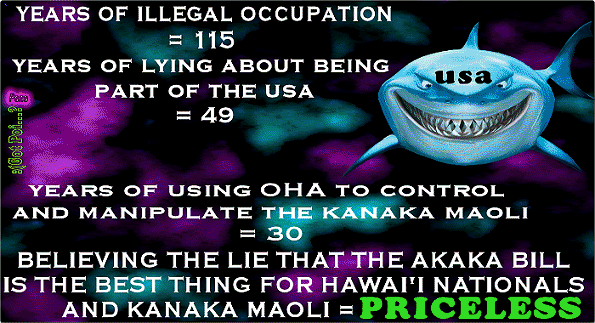


 MOBILE, Ala. -- The largest aluminum catamaran built in the US launched from Austal USA's Mobile shipyard on Monday, a milestone that the shipyard feels "further strengthens (its) experience in advanced aluminum vessels over 100 meters in length."
MOBILE, Ala. -- The largest aluminum catamaran built in the US launched from Austal USA's Mobile shipyard on Monday, a milestone that the shipyard feels "further strengthens (its) experience in advanced aluminum vessels over 100 meters in length."The 113-meter high-speed ferry is the second of two vessels built in a $190 million deal with commercial client Hawaii Superferry Inc., which operates the first Austal-built vessel in the Hawaiian Islands.
Like the original vessel, it is designed to carry 866 passengers and 282 cars. It is six meters longer than the first vessel, thanks to a ramp that makes it suitable for military use.Hawai`i Supferry Inc. has said it plans to operate the vessel commercially.It is scheduled to start service in May 2009.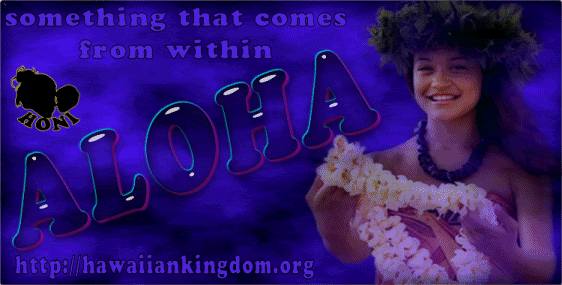
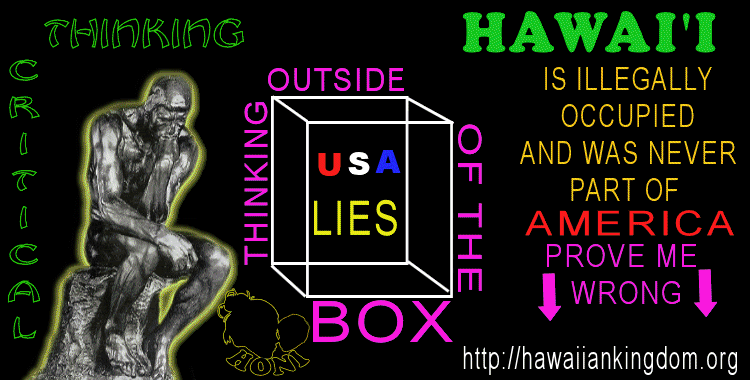 Inside USA - The Other Hawaii - Sept 26 - Part 1Inside USA - The Other Hawaii - Sept 26 - Part 2
Inside USA - The Other Hawaii - Sept 26 - Part 1Inside USA - The Other Hawaii - Sept 26 - Part 2
